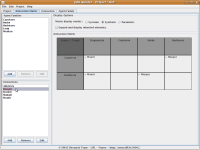
- Website Overview
Website Overview
IODA
The Interaction Oriented Design of Agent simulations (IODA for short) project aims at defining a method to model Multi-Agents Based Simulations from a brand new point of view. It does not center design on agents anymore, but on the interactions they perform together instead. Thereby, we reverse the usual context in which agents are the main elements of the simulation, in order to focus on the interactions that occur in the system. This has many advandages, including that :
- the interactions that occur between the agents are defined by a plug'n play process;
- the interaction matrix can be automatically transformed into code;
- along with simulations, interactions libraries are built;
- the interaction matrix is fit to design large scale simulations;
- the incremental conception of simulations is supported intuitively ;
- all entities that lie in the environment are agents.
IODA provides many different methodological supports, like matrix inheritance, agent inheritance, etc (see the page dedicated to IODA).
JEDI
A simualtion framework, called Java Environment for the Design of agent Interactions (JEDI) was developped to illustrate how to implement simulations with IODA. This simulation engine is designed for reactive situated Agents, and discrete time simulations, i.e. for simulations where:
- Agents lie and act in a two dimensionnal space;
- Agents only react directly to stimuli, and have almost no representation of their environment;
- time elapses by simulation steps, during which every agent acts once.
|
JEDI was implemented as a highly parametrable framework (see the page dedicated to JEDI). The following java applet demonstrates IODA principles, and illustrates how the behavior of agents are dynamically defined with the interaction matrix: |
 . .
|
JEDI-Builder
|
A code generator called JEDI-Builder was built to guide users to design simulations with IODA, from model specification to its implementation. |

|
LEIA
IODA makes possible to generate random simulations -- with a given an interaction ontology. Thanks to that property, we were able to build the LEIA (for: LEIA lets you Explore Interactions for your Agents) simulation stace explorer. It makes possible to explore the space of all possible interactions for a particular ontology.
